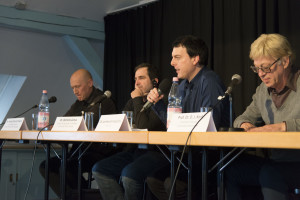(Dr. Horst-Dietrich-Elvers, Dr. Dominic Corva; Dr. Jan-Henrik Friedrichs; Dr. D.J. Korff)
by Dr. Dominic Corva, Executive Director
I can hardly believe it was a few hours short of a week ago I left Seattle for Berlin to participate in a conference on the topic of Cannabis Legalization at Berlin’s Friedrichshain-Kreuzberg Museum. The public event was very well attended and featured a terrific keynote address from Dr. Jan-Henrik Friedrichs, cultural historian, on conditions of urban development and refugee politics that catalyzed the need for a public discussion on a proposal being developed by the District mayor, Monika Herman, to establish a legal cannabis market in the Goerlitzer Park.
As with cannabis politics in modernity, the social issue had very little to do with cannabis itself and mostly to do with the concentration of African refugees selling cannabis in the “Gurly” as the park is known locally. This issue seems to have developed over the last three years: drug dealing by young black men in the park has been common in the past, but some families and children’s social workers are reporting themselves “squeezed out” of the park due to aggressive marketing.
This is apparently the consequence of dealers being “pushed out” of other Berlin parks in recent years, rather than simply a matter of more consumption or dealing. While accurate numbers are probably hard to come by, one panelist suggested that 90% of the dealing in the park is in cannabis flowers. Additionally, property values around the park seem to be rising rapidly with the intensification of gentrification. Mayor Herman’s plan, in principle, seemed intended to regulate and formalize local cannabis markets in order to (a) prevent the rise of “hard drug” markets; (b) make things easier on the local refugee population as they are increasingly stigmatized as drug dealers and (c) address local concerns about especially children’s safety in the park.
The Mayor’s point person on this initiative is Dr. Elvers, pictured above on the left. Dr. Elvers was the only person in the audience really prepared to discuss technical issues associated with implementation rather than political issues including whether or not refugee issues could be addressed through legalization. Dr. Elvers has his job cut out for him, and both the Dutch professor Dr. Korff (above, far right) and myself had limited relevant comparative context for addressing his technical questions. Dr. Korff’s perspective is from the Dutch coffeeshop system, which is a decrim policy for retail and on-site consumption; and mine of course is from Seattle/the U.S. where 20 years of medical cannabis politics have created more fertile grounds for addressing legalization. I did, however, get a chance to talk to him one-on-one where I urged him to start with community meetings, to get reticent locals — the ones who are complaining about the Gurly Park situation — to feel like they have a voice and to have a place where they can voice their fears. His reaction was fascinating: apparently that’s what he wanted to push for first but the mayor’s office decided other things were more important.
At any rate, the conference was a terrific success — attended by the Berlin Mayor and a Federal politician who has long advocated cannabis lilberalization, Hans-Christian Ströbele. Museum director Martin Duspohl was amused the next day to find out how the right wing newspaper covered the conference: by announcing that it cost $5000 Euros, highlighting my participation and that of noted leftist and national politician Hans-Christian Ströbele. It is my honor to have such a person as second bill in a complaint about wasted taxpayer dollars! The conference was covered with more nuance and discussion here and here.
*****The flyer for the conference, in German******
“Legalize It!?” Conference Flyer PDF: Legalize_It_final_20-5-14_web
